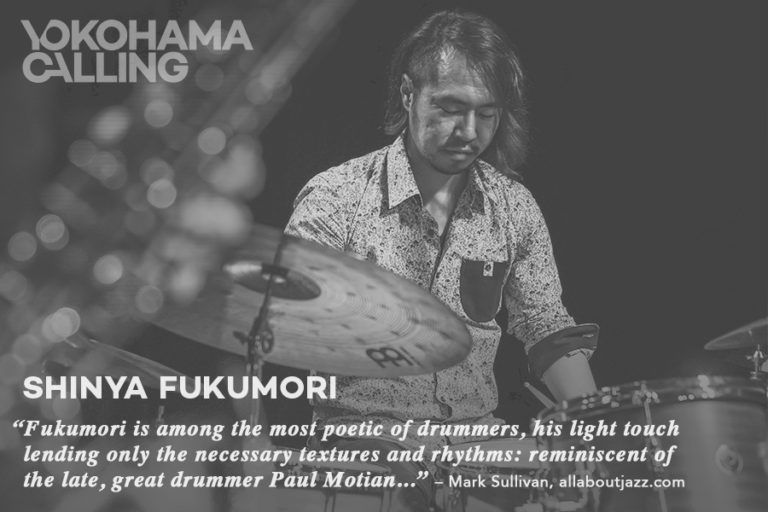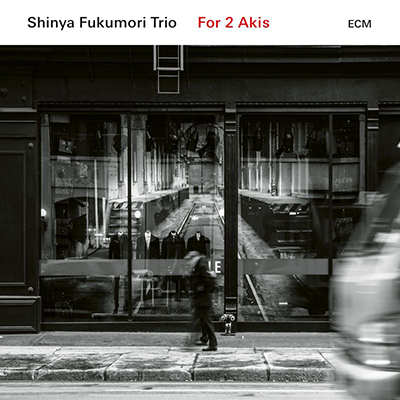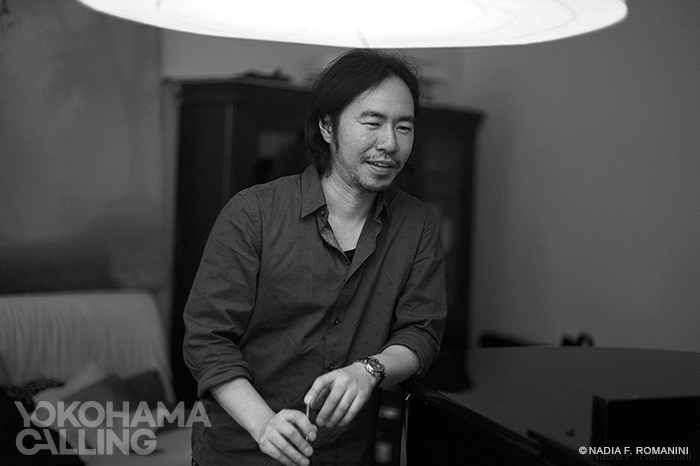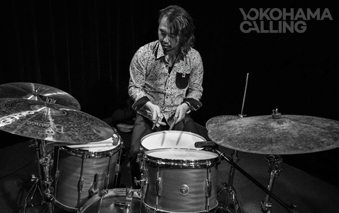Japanese composer/drummer Shinya Fukumori, based in Munich, comes to London. He is one of the rare musicians who’s recording debuted on ECM, the prestigious German label with distinctive taste and sound.

ECM is known for its works that reflect the extremely delicate aesthetics of the co-founder Manfred Eicher, and only artists that match their view are allowed to release albums on the label. Needless to say, it is a narrow gate, and that is the reason why the label is respected worldwide. For example on the list of artists, you may find the name of Keith Jarrett, who is known to be a demanding man.
Fukumori has released his leading album “For 2 Akis” last year as Shinya Fukumori Trio on ECM. The melody he creates is so calm and beautiful. When you listen to that melodic mature sound, you might be calling some sense of warm scenes to your mind that is a fine mixture of ordinary and extraordinary in everyday life, just like the music video ECM created for his song.
Shinya Fukumori Trio “For 2 Akis”
This album also includes some old Japanese songs such as Kenji Miyazawa’s “Song of Star Tour – Hoshi meguri no uta” and Rentaro Taki’s “Moon over the Ruined Castle – Kojyo no tsuki”. Those songs have been given new personalities by Fukumori.
Now Fukumori is going to perform in the UK for the first time by the invitation from YOKOHAMA CALLING, a UK based organisation promoting Japanese-English cultural events. For him, this is the first collaboration with UK based musicians, too. Fukumori talked about his music, ahead of his first memorable performance in London.
Shinya Fukumori
Born in Osaka, Japan. He started drums at the age of 15. After moving to the U.S.A. at the age of 17 to study music, Fukumori attended Brookhaven College and University of Texas at Arlington. Then he finished his studies at Berklee College of Music in Boston, MA. In 2013, after 10 years of living in the U.S.A., he relocated to Munich, Germany. Known for his melodic and rhythmic approach with a wide range of dynamics to drum-set playing. Another feature of his playing is the unique and sensitive cymbal-work, which creates a very distinctive sound. In March, 2017, Fukumori recorded his debut album “For 2 Akis” for ECM Records with his trio, which was produced by Manfred Eicher. The debut album was released on February 16, 2018.
ECM debut and past music life
Why have you relocated to Munich after a long period of living in the US?
I’ve lived in Texas for 7 years studying music, then moved to Boston to attend at Berklee. I loved Texas; loved the hot climate and open minded people, I still feel like it’s my second home. Then I left the States and moved back to Japan because I got tired of the music I was playing back then, and shortly after, I decided to come to Munich because I felt much closer to the music from Europe, and most of all, I wanted to live where my “dream record label” ECM exists. And by chance and lots of good lucks, the producer Manfred Eicher happened to listen to my music. After a while, he came to our rehearsal and watched us play, and he said “Yes, I would like to record this”. That’s how it all happened.

Tell us the reason why you’ve been being captivated by ECM.
I’m fascinated by their distinctive orientation. They have a very solid axis. And simply, the sound is so beautiful. The music from ECM took a really big part when I was establishing my own style of playing music. ECM showed me some new ways and wide ranges of expressing music. Therefore, I am so happy that I got to release my debut album from ECM, it’s just priceless. Not to mention, it’s been simply a big pleasure for me to see the increase of audience appreciating my own music by releasing this album. And of course this has led me to the tremendous encounters all over the world, and I’ve been very inspired by that.
You are currently writing a series of essays in a Japanese jazz e-zine. You have written there that you encountered very evocative music when you listened to a fictional band in the film “Swallowtail” with your friend in the dark room when you were a teen boy. You’ve got some kind of intriguing inspiration, then thought “well, this is a kind of music I really want to make”. What exactly did you feel about it?
It felt almost like I was in a planetarium. Felt like I was connected with vast space like the universe. It was a strange yet intriguing feeling; strongly connected to various places but at the same time, it was still a space of my very own.
Does that curious sensation lead to the sound you currently create? For example, “Hoshi Meguri no Uta”?
Those Japanese songs were not really strategically placed, I just picked and arranged them simply because I liked the songs. I’m not good at planning at all, I am a kind of person who acts intuitively (laughs). But I could say this; I am very fond of the simple and beautiful melody-lines from the old Japanese folk songs. One can probably find me as Japanese with that sense from that aspect also. I’d like my music to be somewhere abstract, a sense of right distance, that seems to be catchable, but you can never grab it; not too far nor too close.
Sounds like you always follow your own intuition rather than planning?
I’m not trying to do anything on calculation, I always leave things to natural development.
What does the song “For 2 Akis” mean, which is also the album title?
This is a song dedicated to the owner of the jazz bar “Interplay 8”, Akitoshi Nakamura, and Aki, the staff who has worked there for a long time. Those two “Akis” helped me a lot when I returned to Osaka from the States. The original song title was “A Song I Wrote for 2 Akis” then it got shortened. The former owner supported Yosuke Yamashita since he was unknown exactly like the current owner did for me. Because of this strong connection, the summer of this year, they held a special duo concert with Yosuke-san and myself on the occasion of the 60th anniversary of the place and the birthday of the former owner. It was an unforgettable night for me. Anyway, this is a special song packed with my appreciation to the two “Akis” as well as to all the friends I have met there!
Why drums?
You started playing the violin when you were a child then developed your music way to playing the piano and the guitar very easily. But you ended up with drums. Why is that?
I think my father’s influence was the strongest. He played drums when he was in college. Because of that, there were drum sticks always lying around the house since I was a kid, and we often talked about music, especially about drums. Even though I was also playing the piano and the guitar, I already knew I would play drums in the future. My father once said that “you have a great sense of rhythm, so you will be able to play drums easily”, and that of course pushed me to playing drums too.
What is the role of drums in music?
That’s a difficult question. I used to think that playing rhythms and grooves on drums was cool. At least I felt so when I first started playing jazz. But when you go deeper into the drum-set playing, you realize that that’s not the only essence there should be, especially in the music I do. The drums can also be a melodic and/or a harmonic instrument. I’d like to believe that it is possible to play both melodies and harmonies on the drums. I always expect drums as an instrument that can add colours rather than just beating out rhythms and grooves.
So you chose jazz?
I don’t have any “genre” awareness. Even in music with vocals in any genre, there is always a way to show some colours. When I’m playing the drums, the word “jazz” doesn’t exist in my mimd.
How did you develop your current style?
I love the drummer Vinnie Colaiuta, and I always wanted to be like him. But I’ve noticed one day that’s not what I really want to do. The thing is… when I was studying at Berklee College of Music, there were hundreds of students who wanted to be like Vinnie. In the practice rooms, a lot of students were practising “chops” like Vinnie, and it almost became like a technique tournament. But that’s not the only reason why Vinnie’s performance is outstanding, he also can make very subtle, delicate sounds with drums.
That is why you decided to develop your own performance?
That’s a big one. I thought Vinnie already exists and plays, so what is the point to become Vinnie2? From that point on, I changed my attitude then started trying to seek my own style. By the way Vinnie has been playing a lot with Jeff Beck recently and personally I’m very happy to see they are playing together. Two of my big favourite people finally decided to play together (smile). The other day, I was talking to a friend saying “who is the musician who has the best sound?” It was Jeff Beck that came to my mind immediately. The emotions poured into every little sound is just amazing. Even when you listen to just one sound of his, you can feel all his intention.
Is that similar to how you express yourself in your music?
To be honest, I’ve never really intended to express something in music… well I just don’t want to have the answer to that question. As I said earlier, I want music to be abstract, so I will pursue it. Apart from that, I don’t want to make any musical concept for my music. I like Jackson Pollock as an artist. I think what I want to express is something that comes out of that type of abstract.
Then, how would you describe your music in words?
The most ideal art form of music for me is very clear (laughs). I have a strong feeling that I have the same views drawn by the comedian Kentaro Kobayashi (Ramens). The genre is completely different, but the music that I am aiming for is there. It’s quite difficult to explain in words. I think those sketches created by Ramens are very artistic and purely a beautiful art form. I really like the words often expressed by Mr Kobayashi – “ordinary things in out-of- the-ordinary” – I get inspirations from that concept a lot. This intriguing feeling may be linked to what I felt when I was listening to the music from the “Swallowtail” band.
After the debut on ECM
After the major debut from ECM, it seems that activities surrounding you are becoming more lively.
The debut album was a very good opener for many people from different directions. For instance, I stayed in Japan for three months from this June for lots of music activities. There has definitely been a clear expansion of opportunities after meeting various great musicians while I was there, and I am simply very happy about that.
I felt very fresh when I performed in Japan this time. The whole experience was so different from the last long stay when I came back from the US about 8 years ago. I’m sure that I’ve reached a different stage. I mainly stayed in Tokyo this time, it was very stimulating to meet wonderful musicians who I‘d never known before. Actually I am now looking for ways to help connect people between Japan and overseas.
Sounds wonderful! Please tell us more.
The Japanese music scene focuses on the US and UK too much, and from there you can get the latest music almost effortlessly. But in Europe it’s not the case. You don’t see any exchange unless you make an effort. What I want do from now on is to become the bridge between Japan and Europe. I want to introduce good European music to Japan, and the other way around too. I recently made an arrangement of performances in Japan for instance, for Japanese pianists such as Ayumi Tanaka based in Norway and Naoko Sakata based in Sweden.
Another story. I had opportunities to go to South Korea twice this year. What I found there was wonderful musicians and local people with a very warm welcome. It’s been reported that Japan and South Korea are having a politically difficult situation, but I just had only great impressions in terms of people and the city while I was there. But sadly, there is only very little musical interactions between Japan and South Korea at the moment, especially in the area of the music I am in. So I am hoping that I can be a good bridge between the two countries as well. Actually soon, interesting events will be arranged in Japan with the Korean saxophonist Sungae Son who has also released an album on ECM. He is a truly wonderful musician and I think people should know him.
Tell us about your life in Munich and your latest activities.
Munich is a beautiful city where you can spend a lot of time in many parks. Bavarian food is delicious. I like drinking too, so being able to have good beer is perfect! Finding good eateries and trying delicious food sort of became my hobby. I like cooking too and make it well. I have a passion for making good meat sauce since I was in college. I like stewed dishes such as chili con carne, doing nothing while the pot is on the hob gives me happier time.
About my latest activies, the guitarist from “Orange Pekoe”, Kazuma Fujimoto will come to Munich in October and we will perform together. And I will go to London by invitation of YOKOHAMA CALLING!

British music
What’s your view on British music?
I actually wanted to study in the UK rather than the US because I was very into British hard rock. Since I was a little kid, I was in love with Deep Purple and I could say that was the most influential band as the band led me to start playing drums – Ian Paice is one of my drum heroes. For me, the UK means Led Zeppelin, Jeff Beck and Deep Purple, a place to remember the great music of the 70s. I am so happy that YOKOHAMA CALLING will have me this time.
Please give your message to the UK audience!
I love British music, that’s definitely one of my grass roots of music, although this will be my first visit to the UK! I can’t wait and really look forward to it. I’m also excited to meet new people there and so thrilled that the people who have never listened to my music will have a chance to know my music too. I will see you there!
“Music is not something to think about, it’s all about intuition.” Shinya taught me in this interview. As he gives a pure attention to every single sound, you will understand it much more when you listen to his music live. Please come by all means!
Interview by Mayu Ekuni
This interview with Shinya Fukumori is available in Japanese here.



